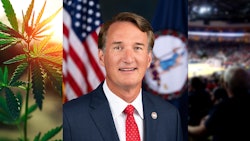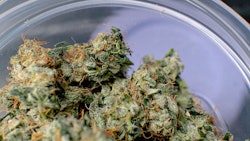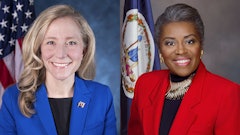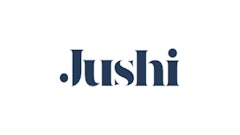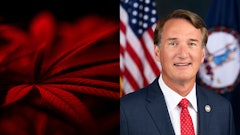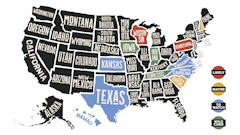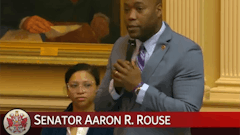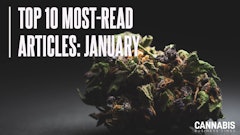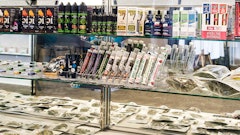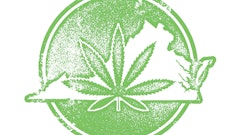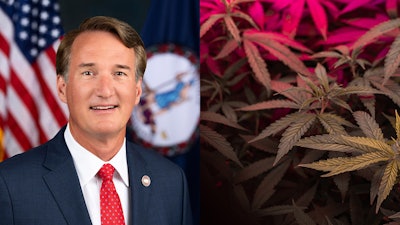
Virginians will not have access to tested and regulated adult-use cannabis any time soon, despite nearly three years of legal possession and home grows in the commonwealth.
That’s because Republican Gov. Glenn Youngkin vetoed a cannabis sales bill March 28, a month after Virginia’s Democratic-controlled General Assembly passed the legislation almost entirely along party lines. The bill would have allowed licensed dispensaries to begin selling cannabis to those 21 and older on May 1, 2025.
Under former Democratic Gov. Raph Northam, Virginia legalized the possession of up to 1 ounce of cannabis for adults 21 and older as well as the home cultivation of up to four plants per household, provisions that became effective July 2021.
But in his veto message on March 28, Youngkin said legalizing adult-use cannabis retail sales endangers Virginian’s health and safety.
“States following this path have seen adverse effects on children’s and adolescent’s health and safety, increased gang activity and violent crime, significant deterioration in mental health, decreased road safety, and significant costs associated with retail marijuana that far exceed tax revenue,” he wrote. “It also does not eliminate the illegal black-market sale of cannabis, nor guarantee product safety. Addressing the inconsistencies in enforcement and regulation in Virginia’s current laws does not justify expanding access to cannabis, following the failed paths of other states and endangering Virginians’ health and safety.”
Many legalization advocates and industry stakeholders expected this veto given Youngkin’s public stance on cannabis since taking the governorship in 2022. Eight days before issuing the veto, Youngkin told the press, “Anybody who thinks I’m going to sign that legislation must’ve been smoking something.”
This comment came after tensions arose between the governor and Senate Democrats over a proposed sports arena deal that the governor supported—one that would have brought the Washington Wizards (NBA) and Washington Capitals (NHL) to the commonwealth—but lawmakers provided no funding for the arena in a budget bill.
With Virginia lawmakers voting to pass the cannabis sales bill with a 51-47 vote in the House and a 21-18 vote in the Senate, Democrats don’t have the two-thirds supermajority support needed to override the veto.
The governor’s rejection comes at a time when 60% of Virginia voters support adult-use cannabis sales, according to a January 2023 survey conducted by pollsters at Christopher Newport University.
While Youngkin laid out several reasons he believed justified the veto—such as “adverse effects” on children’s health and safety, the “failures” of states that have commercialized markets, and an increase in “violent crime” and “psychiatric disorders”—cannabis law reform advocacy organization NORML refuted many of these claims.
Specifically, NORML pointed to data from the Centers for Disease Control and Prevention that showed a 30% decrease in the percentage of high schoolers who used cannabis between 2011 and 2021—a timeframe when 11 states launched the nation’s first adult-use markets. Among other surveys, NORML also cited compliance data from California, Colorado and Nevada that shows licensed adult-use retailers don’t sell cannabis to those under 21.
JM Pedini, NORML’s development director and Virginia NORML’s executive director, questioned Youngkin’s understanding of the issue he vetoed.
“Governor Youngkin has just shown Virginians exactly how out of touch he is with the widely accepted science and policy research on cannabis in the U.S.,” Pedini said in a public statement. “Virginians deserve better than this head-in-the-sand approach to lawmaking from their elected officials. The only protection Youngkin’s veto provides is to the illicit market that has ballooned during his time in office.”
In a post-veto interview with ABC affiliate 7News DC, Youngkin said he rejected the legislation for a commercial market because “Cannabis is bad for Virginia,” claiming that the states that have already provided access to tested and regulated retail products have experienced “massive” increases in child poisonings and adolescent usage.
“And of course, when you combine that with the fact that the potency of cannabis today is dangerous, it drives mental health challenges … to the point of psychosis,” Youngkin said. “There’s also been a systematic increase in these states in violent crime. Of course, the black market doesn’t go away.”
The governor’s remarks on unlicensed cannabis sales are contrary to 2023 consumer survey data compiled by cannabis business intelligence provider New Frontier Data, which reported that 69% of cannabis consumers in adult-use states obtain their cannabis from a dispensary or delivery service, while 6% obtain their cannabis from a “dealer.” In states that don’t have regulated marketplaces, 17% of cannabis consumers obtained their cannabis from a “dealer” and 31% obtained their cannabis from a “friend.”
In Virginia’s medical market, Green Thumb Industries, The Cannabist Co. and Jushi Holdings Inc. are the only three licensed businesses, which combined operate 22 dispensaries in the commonwealth.
Following Youngkin’s veto, Green Thumb CEO Ben Kovler said on social media that the governor cited false statistics as evidence, including his claim that legalized states experienced massive increases in adolescent usage.
“This is false,” Kovler said. “Don’t confuse him with the facts.”
Virginia Gov Youngkin vetos cannabis legalization in Virginia, citing false statistics as evidence:
— Ben Kovler (@Bkov9) March 28, 2024
"Cannabis is bad for Virginia. And in all the other states that have had an extensive retail market, what you see is... massive increases in adolescent usage."
This is false.…











